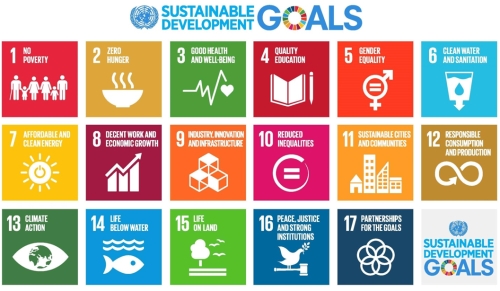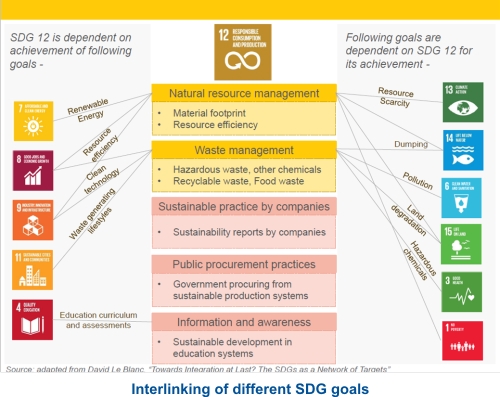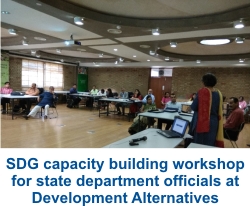India’s SDG Pathways - A Brief Story
India
is one of the members of the 193 Unit ed Nations states which has signed the
Paris Agreement and adopted the Sustainable Development Goals in 2015. India
played a key role in shaping the global SDG agenda and ensured a striking
balance among its three pillars – economic, social and environmental. As a
pioneering country, India has started its work at the national, regional,
state and local government levels to achieve the seventeen SDGs by 2030. The
prime focus currently is to address the critically important areas targeting
poverty, hunger, education, health and well-being, gender equality, water
and sanitation, energy, economic growth along with infrastructure,
consumption and production, climate change and environment.
ed Nations states which has signed the
Paris Agreement and adopted the Sustainable Development Goals in 2015. India
played a key role in shaping the global SDG agenda and ensured a striking
balance among its three pillars – economic, social and environmental. As a
pioneering country, India has started its work at the national, regional,
state and local government levels to achieve the seventeen SDGs by 2030. The
prime focus currently is to address the critically important areas targeting
poverty, hunger, education, health and well-being, gender equality, water
and sanitation, energy, economic growth along with infrastructure,
consumption and production, climate change and environment.
Implementation of SDGs at the National Level
To achieve the seventeen goals, 169 targets and 230 indicators of SDGs, the country has launched a number of development programmes to make progress towards these goals. The National Institution for Transforming India – NITI Aayog is the national think tank and is primarily responsible for coordinating the implementation of the SDGs in India.
NITI Aayog has undertaken a mapping of all the current schemes being implemented by the national ministries and state departments to connect to the SDGs and their targets. It has already identified lead and supporting ministries for each target. A government-wide approach to sustainable development has been adopted, emphasising the interconnected nature of SDGs across economic, social and environmental pillars. All the states have been advised to undertake a similar mapping of their schemes, including centrally sponsored schemes.
The leading Ministries responsible for tracking the social goals (Goal1,2,3,4,5,6 and 16) are Ministry of Rural Development, Women and Child Development, Health and Family Welfare, Agriculture and Farmer Welfare, Water Resources, Skill Development and Home Affairs. Tracking the implementation of the economic goals (Goal 7, 8, 9, 10, 11,12), the lead responsibilities lie on the Ministry of Power, Labour and Employment, Commerce and Industry, Social Justice and Empowerment, Urban Development. On the other hand, tracking of implementation of the ecological goals depends on Ministry of Environment, Forest and Climate Change. (Ref: Sustainable Development Goals (SDGs) – Draft Mapping, Development Monitoring and Evaluation Office, NITI Aayog, New Delhi).
However, the targets of one goal are directly or indirectly linked to the targets of other goals and, therefore can positively or negatively impact each other.
Ministry of Statistics and Programme Implementation (MoSPI) has been entrusted to develop national indicators for the SDGs in line with the global indicators. State governments are key to India’s progress on the SDG agenda and several of them have already initiated action on implementing the SDGs.
Action by State Governments towards progress of SDGs
Like the national ministries, state government departments are also putting efforts to achieve the SDG agenda. As directed by NITI Aayog, all states are in the process of drafting their 15 years vision, 7 years strategy and 3 years plan to achieve SDGs by 2030. Some of the state governments have taken this agenda in a mission mode. Sikkim became the first state in India to draft a ‘Well Being of Generation Bills in 2017’ which is currently under consideration for law to be made at the state’s legislative assembly. Karnataka, Andhra Pradesh, Kerala, Assam are the first moving states in achieving the SDG goals through their different developmental schemes. However, states like Chhattisgarh, Orissa, Madhya Pradesh are more focussing on capacity development of the state department officials as the first step to work towards SDG agenda. Local government also plays an equally important role. Fifteen of the seventeen goals are directly related to activities being undertaken by local governments at Panchayats and block levels. Some state governments are paying attention to visioning, planning, budgeting and developing implementation and monitoring systems for the SDGs.
Initiatives by the Private and Corporate Sector
The SDG initiatives are not only taken by the government at various levels, it is also a priority agenda for a number of big corporate organisations. Big private organisations publish their sustainability report to improve their performance and communicate publicly their sustainability data. These reports can be used to help understand how businesses interact with the SDGs.
In the recently concluded World Economic Forum (WEF) in Davos, Switzerland in January 2018, eleven global corporations announced that they will ensure all their packaging is reused, recycled or composted by the year 2025. The companies that made the pledge are behind many household consumer brands including L’Oréal, Mars, Marks & Spencer, PepsiCo, The Coca-Cola Company, Unilever, Walmart and Werner & Mertz. These companies are working on this transition with the Ellen MacArthur Foundation, a UK-registered charity whose mission is to accelerate the shift to a circular economy.
Initiatives by Civil Society Organisations

Civil Society Organisations such as WWF-India, The Energy Resource Institute (TERI), Development Alternatives, National Foundation for India, Oxfam India are the front runners in this case. The main objective of these organisations is to do research, analysis, data collection and capacity development of the state and central government officials from Himachal Pradesh, Uttar Pradesh, Sikkim, Karnataka and Madhya Pradesh on tracking of SDGs in their state developmental programmes.
Monitoring and Review of SDG Agenda by UN
India has been participating at the High-Level Political Forum (HLPF) for the international review of progress of Sustainable Development Goals (SDGs) on a regular basis since 2016. India participated first time in July 2017 at this forum and NITI Aayog presented India’s first voluntary national review on implementation of SDGs.
In spite of all these developments, India still needs to go a long way to achieve the SDG agenda by 2030. There is already an apprehension about the ability of the national government to track and gather data for comprehensively evaluating the accomplishment of SDG targets. Lack of credible data could be a roadblock for India in achieving the global goals. A strategy to address this concern could be a complete decentralisation of the data collection process. The government could tap regional and local partnerships and build stakeholder capacities to gather and track data.
Achieving the SDGs in a diverse country like India is definitely a big task, but is not unachievable. We need to clearly identify priorities, have locally relevant and people-centric development policies and build strong partnerships. The government also needs to have a focused plan for tracking and evaluating impact and scaling up successful interventions. The SDGs are a direction and a vision for India to ensure prosperity and growth - on social, ecological and economic fronts. ■
Gitika Goswami
ggoswami@devalt.org